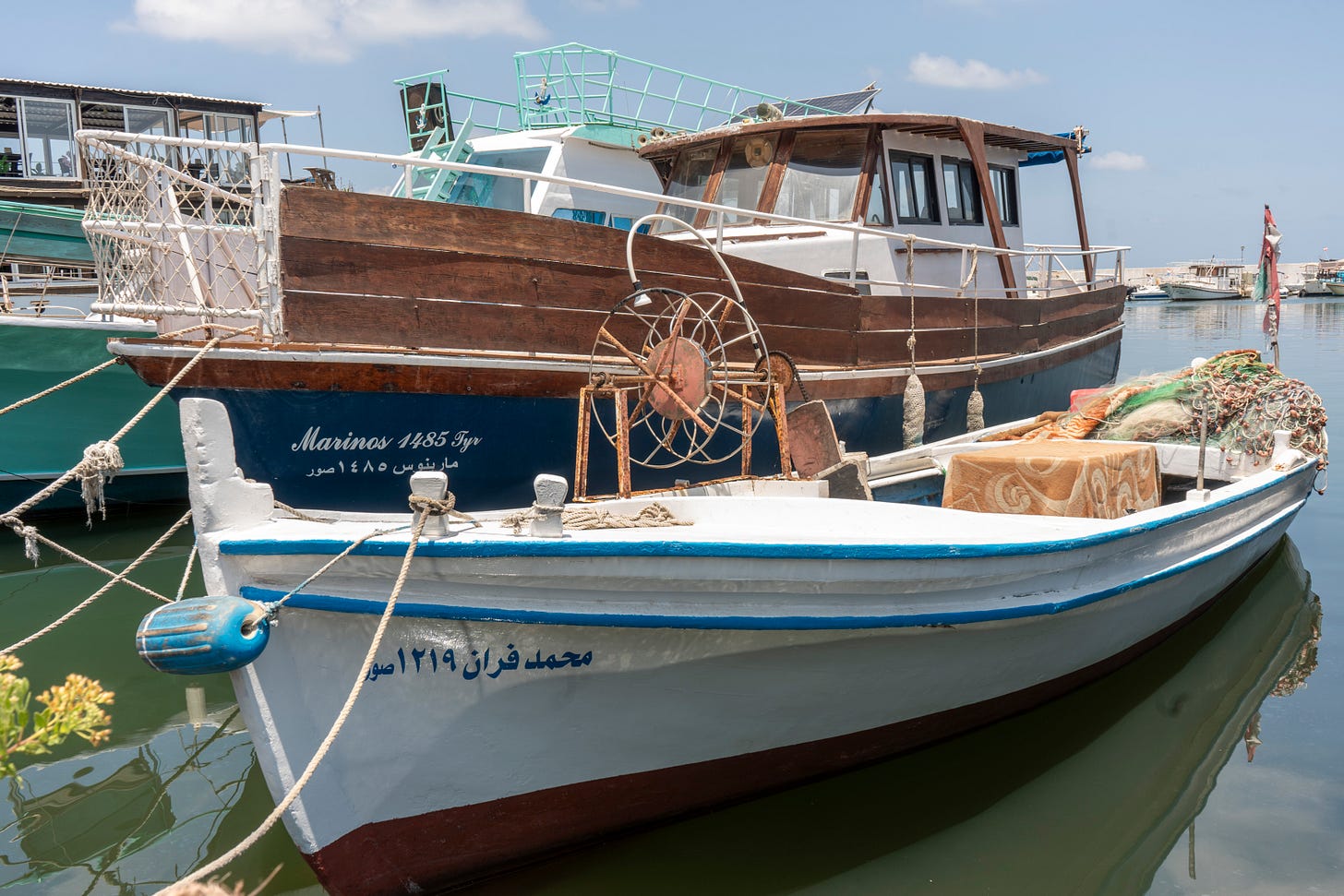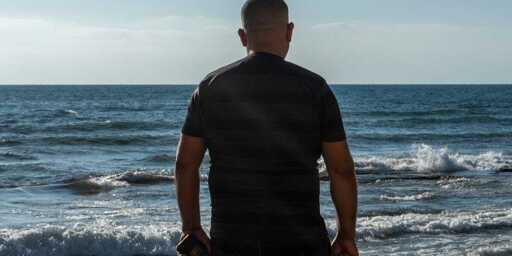 Ahmad Salim stands before the Mediterranean, which touches the shore right behind his home in Sarafand, southern Lebanon.July 15, 2025. (Fatima Joumaa, The Public Source)
Ahmad Salim stands before the Mediterranean, which touches the shore right behind his home in Sarafand, southern Lebanon.July 15, 2025. (Fatima Joumaa, The Public Source)
Published in partnership with The Public Source.
SOUR, LEBANON—On the morning of February 2, Atef Ahmad Juhair and his cousin Mohammad set off from the southern Lebanese port of Naqoura, just as they had done countless mornings before. Atef, 47, and Mohammad, 33, grew up fishing in the crystal clear waters off the southernmost stretch of the Lebanese coast. By 8:15 a.m., they were roughly two kilometers from the country’s southern maritime border. Atef was underwater, compressor dive-fishing with his harpoon gun, when Mohammad urgently yanked him up using the air hose he was attached to. Two Israeli gunboats had invaded Lebanese waters and were headed straight in their direction.
Atef could see around 20 masked soldiers on each gunboat. When they got close enough to be within earshot, a soldier yelled in Arabic for Mohammad to get into the water.
“I can’t swim,” Mohammad yelled back.
The soldier shot him in the hip with a rubber bullet and repeated his order. Mohammad insisted that he couldn’t swim. At gunpoint, the two men handed the soldiers a backpack with their phones and IDs. Then, one soldier leaned across to hand Mohammad a life vest. As he reached for it, the soldier grabbed him by the arm and yanked him into the water before hauling him onto the gunboat. The soldiers sped away with Mohammad handcuffed onboard.
A shaken Atef flagged down a nearby fishing boat and shouted for the driver to report the incident to Lebanese military intelligence, since he no longer had a phone to do so himself. He rushed to shore and headed straight to a Lebanese army office in the city of Sour 30 minutes north, who directed him to another office in Saida, where he gave a full account of the abduction. Saida intelligence kept him at the station most of the day, but he said that after he left, no one from the army followed up with him or with Mohammad’s immediate family.
“It’s as if nothing is going on,” Atef told The Public Source in a phone interview. “No one is asking about anything, not a single authority figure, not the state, not the Red Cross.”
Fishing Under Fire
Mohammad Juhair’s disappearance is part of a string of recent Israeli attacks on fishermen operating near Naqoura, the southernmost municipality on the Lebanese coast. Since the cessation of hostilities between Israel and Lebanon took hold in November 2024, Lebanese fishermen have been stalked by drones, threatened through intimidating leaflets, and directly targeted by Israeli vessels.
In June, Israeli forces kidnapped another Lebanese fisherman while he was fishing with a friend near the southern border. Weeks later, the Israeli military bombed a fishing cooperative building in the village of Naqoura. These tactics mirror Israel’s long-standing violence against fishermen in Gaza, where occupation gunboats fire directly at Palestinians who take their vessels out slightly past the shore. In July, the Israeli military declared that the sea was a “no-go zone” for Palestinians in Gaza, banning all fishing, swimming, or any form of sea access. The Israeli occupation has killed more than 200 fishermen in Gaza since October 7, 2023.
The Public Source spoke to 11 fishermen who work between Saida and Naqoura who said the repeated Israeli attacks have driven fishermen away from the country’s southernmost waters, forcing them to cluster further north near the city of Sour, where the catch is less plentiful. The fish stalls along Naqoura’s docks, once a bustling hub for southerners and tourists looking for the freshest catch of the day, are now abandoned. The Lebanese government has done little to protect fishermen from the Israeli incursions or to compensate them for their losses.
“Nowadays, before a fisherman goes out to sea, he tells his son to take care of his mother. He says goodbye as if he’s not coming back.”
“They’re leaving the fishermen to the wind,” said a member of the fisherworkers’ syndicate in Sour, who asked that his name be withheld for fear of being targeted. “Nowadays, before a fisherman goes out to sea, he tells his son to take care of his mother. He says goodbye as if he’s not coming back.”
A History of Threats
These fears aren’t new. During Israel’s occupation of southern Lebanon from 1978 until 2000, fishermen were routinely harassed. Occupation soldiers frequently invaded Lebanese waters and terrorized fishermen, destroying their nets, detaining them, and humiliating them with strip searches.
Ahmad Salim, a life-long fisherman from the seaside town of Sarafand, was fishing off the coast of Adloun in 1997 when an Israeli gunboat cut off his route. Soldiers forced him into the water and tortured him for hours before eventually letting him go. During the 1990s, many fishermen were detained at sea and imprisoned in Haifa for days or weeks before being returned to Lebanon. Salim’s father was kidnapped by the Israeli military on three separate occasions, with one detention lasting two months.
When southern Lebanon was liberated from Israeli occupation in 2000, fishermen in the area thought the darkest days were behind them. They had built the port of Naqoura themselves, without any form of government assistance. It wasn’t much, but it kept their livelihoods afloat. But the harassment didn’t stop. In a 2019 Al Jadeed TV interview, a young fisherman named Ali Fneish described how the Israelis would throw bombs into the water and set off flares in the direction of fishermen as they worked in the dark.
 These days, most southern Lebanese fishermen avoid going out to sea, fearing for their lives. Port of Sour, Lebanon. July 15, 2025. (Fatima Joumaa/The Public Source)
These days, most southern Lebanese fishermen avoid going out to sea, fearing for their lives. Port of Sour, Lebanon. July 15, 2025. (Fatima Joumaa/The Public Source)
“The first thing we see every morning is Palestine. In the evening, we bid her farewell,” Fneish said in the video. “If we show them that we’re afraid, then we lose.”
When war returned in October 2023, the port of Naqoura mostly cleared out with the exception of a handful of dedicated fishermen. Salim stayed, braving drone surveillance and sonic bombs. But when Israel dramatically escalated the war on Lebanon in September 2024, he was finally forced to head further north, leaving behind one of his two fishing vessels.
After the ceasefire went into effect in late November 2024, Naqoura’s fishermen received permission from the Lebanese army and the UN’s peacekeeping force in Lebanon, UNIFIL, to return to the port and inspect their boats. When they arrived, they found that much of their fishing gear was missing, most boats were either sunken or badly damaged by winter rain and lack of care, surveillance cameras had been installed around the port, and one vessel had vanished entirely. A decent fishing boat in Lebanon can cost upward of $30,000—a fortune in a country where the average fishing household earns less than $1,000 per month.
Salim said that he and the other fishermen had thought things would go back to normal after the ceasefire. Those who still had vessels polished them and headed out to sea, but they quickly found themselves in the crosshairs. If they drifted close to the edge of Naqoura, Israeli soldiers would fire at them directly or send drones their way. The drones were equipped with cameras and explosives; any attempt to tamper with them could result in a deadly blast. Salim said that one flew into his brother’s boat tent and photographed him at close range.
“It’s been five days since I last took my boat out in Naqoura,” Salim said during a phone interview in mid-June. “That’s it, the conditions are unbearable.”
The Second Abduction: Ali Fneish
Mohammad Juhair’s kidnapping in February sent shivers through the fishing community. The fishermen thought that it would be just a matter of days before Juhair returned, but as the weeks went by, they began to lose hope. Instead of docking in Naqoura, they began parking their boats in Sour and accessing the country’s southernmost waters by sea.
That’s what 35-year-old Ali Fneish, the fisherman in the Al Jadeed TV interview, and his fishing partner Abdel Karim Ajami, 36, had been doing since earlier this year. The young fathers had recently begun fishing together again after losing touch for several years. Fneish had opened a small fishing supply store in his village, Maaroub, and Ajami was trying to supplement his income.
 The shop where Ali Fneish used to sell fishing equipment to his fellow fishermen. Maaroub, Lebanon. July 15, 2025. (Fatima Joumaa/The Public Source)
The shop where Ali Fneish used to sell fishing equipment to his fellow fishermen. Maaroub, Lebanon. July 15, 2025. (Fatima Joumaa/The Public Source)
The story of Fneish’s abduction is eerily similar to that of Mohammad Juhair. On the morning of June 4, he and Ajami were fishing off the coast of Naqoura when they spotted an Israeli gunboat advancing towards them. Other nearby fishing vessels, the pair noticed, had already fled. Fneish quickly steered their small speedboat in the direction of Naqoura’s port, while Ajami called Lebanese military intelligence to report the incursion. The Israelis began to shoot at them directly, forcing them to slow to a halt. By that point, they were about a kilometer away from shore, and a small crowd of people—including Lebanese army soldiers—had gathered at the port to watch and film from a distance.
At gunpoint, the men handed over their belongings and were forced onto the Israeli vessel. Occupation soldiers handcuffed Fneish and put a black bag over his head. After a few minutes, they threw Ajami overboard and sped off in the direction they’d come from. Ajami recounted these details over a phone call from the town of al-Abassiya, where he lives and works. Despite a lifetime spent near the sea, he nearly drowned from panic while swimming the short distance from the Israeli gunboat back to Fneish’s vessel.
By depriving Lebanese fishermen of their livelihood, Israel’s attacks form part of a broader strategy of emptying the border region of its people.
A Sea Without a Mandate
“These reports are a clear and serious violation of international law,” said Fadi Hachem, a human rights lawyer and professor at the Lebanese American University in Beirut, about the abductions of Fneish and Juhair. “They violate Lebanon’s national sovereignty, which is protected by the United Nations Charter under Article Two.”
By depriving Lebanese fishermen of their livelihood, Israel’s attacks form part of a broader strategy of emptying the border region of its people. Despite the ceasefire agreement signed by Israel and Lebanon, Lebanese residents have struggled to return to dozens of villages along the southern border due to repeated Israeli drone strikes and incursions.
 Ali Fneish’s mother has been waiting for news about her son since his kidnapping in early June. In the meantime, she waits and holds out hope for his safe return. June 7, 2025. (Fatima Joumaa/The Public Source)
Ali Fneish’s mother has been waiting for news about her son since his kidnapping in early June. In the meantime, she waits and holds out hope for his safe return. June 7, 2025. (Fatima Joumaa/The Public Source)
Over the past six months, occupation forces have struck more than half of the 110 prefabricated houses that were constructed to provide southern residents with temporary shelter and municipal services after the war. The Israeli regime has also repeatedly demolished homes in the south with artillery shelling, and kidnapped shepherds who herd sheep close to the Blue Line—a 120 kilometer “line of withdrawal” demarcated by the UN after Israel ended its occupation of southern Lebanon in 2000.
And while UNIFIL can facilitate the return of a kidnapped shepherd—typically by petitioning the International Red Cross and Israeli authorities—it has little leverage or authority to do the same for abducted fishermen, according to UNIFIL spokesperson Andrea Tenenti. The force’s mandate only requires it to monitor, document, and report Israeli violations on either side of the Blue Line, which does not extend into the sea. The peacekeeping mission does have a maritime task force, but its primary duties involve training the Lebanese Navy and preventing arms smuggling to resistance groups in Lebanon, as opposed to recording or responding to the frequent Israeli violations at sea.
“The mandate is very specific,” Tenenti saidin an interview in Beirut. “It’s to support the Lebanese army. But it’s not related to facilitating humanitarian work.”
Abandoned by the State
The abductions of Juhair and Fneish underscore the inability or unwillingness of the Lebanese state to protect its citizens from systematic Israeli aggression. After the encounter with the Israelis, Ajami visited the military intelligence office in Saida where he was held for more than 24 hours and treated with suspicion. Like Atef Juhair, Ajami said he never heard from Lebanese authorities after he was released.
“They didn’t even offer me a ride home,” Ajami said, noting that he’d arrived onshore without his clothing or belongings.
The family of Ali Fneish felt similarly abandoned. His brother Hussein said they heard nothing from the Lebanese military. He was only contacted by a Lebanese parliamentarian who called as a “courtesy” and Nizar Hani, the head of the Ministry of Agriculture, which regulates fishing. Neither official was able to do anything for Ali.
“The state told us after the war: ‘Oh, people of the south, go down to the south and the state will protect you, the army will protect you’. No one is protecting us,” Hussein said. “We are dying every day in the south. Where’s the state? What state?”
In an interview with The Public Source, Hani said that when he got word of Ali Fneish’s kidnapping, he quickly informed the head of UNIFIL, but received little information about the fisherman’s whereabouts in return. All the fishermen we spoke to said they have yet to receive any compensation from the state for damages they’ve incurred.
The Lebanese army confirmed it can only document Israeli violations and raise them to “relevant authorities” such as UNIFIL and the International Red Cross. Afterwards, the Lebanese Foreign Affairs Ministry may choose to raise a formal complaint to the UN Security Council. What happens next is up to diplomacy.
“When it comes to Israel, America uses its veto power whenever it wants, and the decisions are overruled and remain unenforced,” a Lebanese Army representative said. “We get trapped in this circular game.”
In Ali Fneish’s case, he was kidnapped from “right in front of the tip of the Naqoura port,” according to Ajami, his fishing partner, who also said members of army intelligence and UNIFIL stood along the port and watched the incident as it unfolded. The military intelligence did not respond to multiple requests by The Public Source for comment.
Israel’s Sea of Control
On June 17, the Israeli military dropped leaflets in the port of Naqoura threatening fishermen who dared to go out to sea. “Warning to all boat owners,” it read. “The Israeli Navy will not hesitate to target anyone who dares to approach the maritime border under the guise of fishing.” The leaflet named Ali Fneish specifically, claiming that he was recruited by Hezbollah to carry out missions against Israel, and warning other fishermen that they could face the same fate.
“Why did they take Ali? That’s what we want to know, too. Ali has nothing to do with anything, not with any political party or group,” said Hussein Fneish. “The man is a fisherman and everyone knows him, they know that he’s been fishing for over 20 years, and he has a shop, and he’s at sea every day from dawn until night so he can provide for his family.” Ali has a wife and five children, Hussein added.
 A leaflet Israeli forces dropped in Naqoura, Lebanon to threaten fishermen with the story of the kidnapped fisherman Ali Fneish. June 17, 2025. (Source: WhatsApp)
A leaflet Israeli forces dropped in Naqoura, Lebanon to threaten fishermen with the story of the kidnapped fisherman Ali Fneish. June 17, 2025. (Source: WhatsApp)
“Everyone knows that if the fisherman fishes, he eats. He doesn’t fish, he doesn’t eat,” the member of the fisherworkers syndicate said. Some have begun working odd jobs, he added, driving taxis and doing construction work to scrape by.
When Mohammad Juhair’s family finally got word of their relative, it was not through the Lebanese army or UNIFIL, but from a freed Lebanese prisoner who had been detained by the Israeli military in the border village of Houla in late January.
Ahmad Shukr, who was released as part of a prisoner exchange deal in March, called Mohammad’s mother Shadia to tell her that he had seen her son in Ofer Prison in Ramallah. He’d been tortured, Shukr said, but reassured her he was staying strong.
“People need to get up and speak out, they need to move, to get their voices across. They need to wake up,” Hussein Fneish said. “It started with Juhair, then they came for Ali. Next thing you know they’re going to come after just anyone sitting on the shore.”
From Drop Site News via this RSS feed


